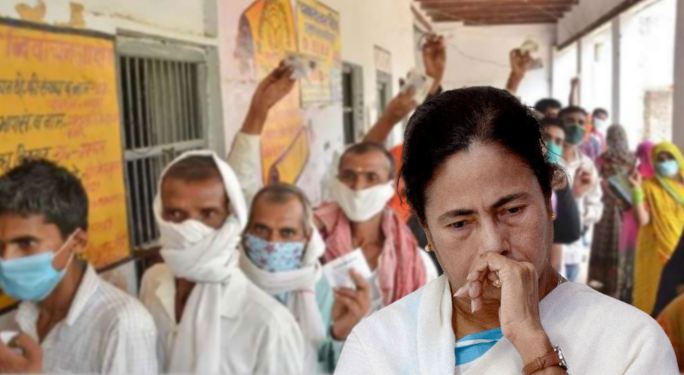- Despite having such a large population and rural constituencies, the state has not witnessed a single incident of poll violence so far.
- Mamata Banerjee had institutionalized her blood-lust poll slogan ‘Khela Hobe’ as ‘Khela Hobe Diwas’ in the state calendar, during the West Bengal assembly election 2021.
- Since the Communist parties came to power in the 1970s, West Bengal has witnessed political violence after almost every election.
Uttar Pradesh, the largest state of the country with more than 22 crore population completed the fourth phase of the ongoing assembly election today. Despite having such a large population and rural constituencies, the state has not witnessed a single incident of poll violence so far. And this is a big lesson for states like West Bengal and Kerala which witnessed many murders and other heinous criminal activities in every election despite having a very small population when compared to UP.
Especially the state of West Bengal, whose CM has extended her support to the Samajwadi Party, should learn a lesson from this. West Bengal has a history of political violence, first under the decades-long rule of the Left and then under TMC. The people of West Bengal were among the very few citizens in the country who exercise their right to vote in a fearful and intimidating atmosphere.
As reported by TFI, Mamata Banerjee had institutionalized her blood-lust poll slogan ‘Khela Hobe’ as ‘Khela Hobe Diwas’ in the state calendar, during the West Bengal assembly election 2021. The selection of the date for starting her campaign against BJP in several states had raised eyebrows, as it happened on the same day when Pakistan’s founder Mohammad Ali Jinnah of the Muslim League had launched the horrific “Direct Action Day” against Hindus back in 1946.
On 16th August, the All India Muslim League leader Muhammad Ali Jinnah sounded a battle cry “either a divided India or a destroyed India”. After this, violent clashes erupted between Hindus and Muslims which resulted in thousands of deaths in Calcutta. The violence spread across the country, reports of riots came from Noakhali, Bihar, United Provinces (modern Uttar Pradesh), Punjab, and the North-Western Frontier Province.
The 2021 assembly election was marred with violence and many BJP and RSS Karyakartas were killed by TMC goons and Hindu families from Muslim-dominated areas were forced to move to the neighboring states.
BIMARU, an acronym formed from the first letters of the names of the states of Bihar, Madhya Pradesh, Rajasthan, and Uttar Pradesh, is often used to describe the sad state of these states in terms – the corruption, violence, poverty, misgovernance, and lack of welfare measures. The term is often used interchangeably with words like cow belt, Hindu heartland by the left-liberal media establishment (often in a prejudiced way).
One state often skipped when describing everything that is wrong with India is West Bengal. The domination of leftists in academia, media, publishing, bureaucracy, and other ‘intellectual’ domains ensured that West Bengal, despite being one of the best examples of bad governance, is kept out of the picture when the bad side of India is being depicted.
Since the Communist parties came to power in the 1970s, West Bengal has witnessed political violence after almost every election. The Communist parties governed the state for 34 years with the generous help of political violence by its cadre, and when Mamata Banerjee uprooted the Communist rule, she simply co-opted the culture instead of changing this.
On the other hand, the so-called BIMARU states witness a very smooth transfer of power even though the government changes after almost every election in states like Uttar Pradesh and Rajasthan. Even Madhya Pradesh and Bihar, which have been governed mostly by BJP – the fascist party according to liberals – for the last one and a half decades witness a very smooth transition after every election.
The killings of more than a dozen workers and the exodus of Hindu minorities to neighboring Assam showed the prevalence of political violence in the state even in the 21st century. The West Bengal government can certainly learn many things from the UP government, with peaceful elections being one.




























